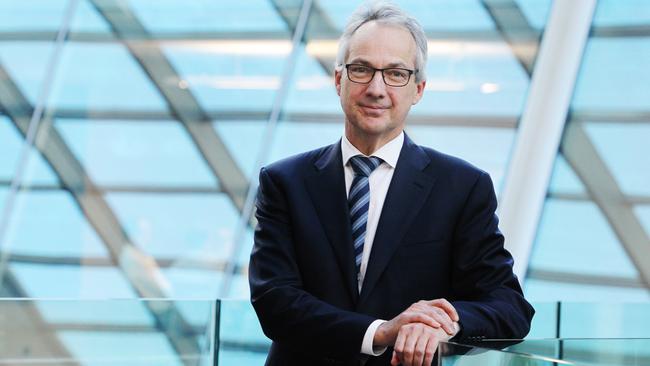Former Macquarie boss who’s on a mission to map out Australia’s trading future
Former Macquarie Group chief Nicholas Moore will be responsible for mapping out Australia’s trade and investment with ASEAN nations to 2040.

For a man who has spent his life in the corporate sector Nicholas Moore makes a great diplomat.
As the federal government’s new Southeast Asia Special Envoy charged with drafting a blueprint for deepening two-way trade and investment with ASEAN nations to 2040, the former Macquarie Group chief deftly bats away questions about Australia’s relative economic underperformance in our neighbourhood.
Still, after three months of consultations with hundreds of businesses, government agencies and investment bodies across Australia and Southeast Asia, and three days of talks on the ground in Indonesia, one issue is impossible to ignore: visas.
“When we think of cross border trade you automatically think of container ships but cross border trade these days is a lot about the movement of people, about skills and development and about how people understand business opportunities which is about moving people, moving investors,” Mr Moore told The Australian in Jakarta.
“No one is going to invest blind. You need to have people on the ground. A lot has been done already but that really does seem to be an area where that growth of knowledge, confidence of opportunities, does seem to be at the forefront of people’s thinking.”
Problems with business visa regimes and labour mobility have long been a two-way irritant between Australia and ASEAN nations, the world’s fastest growing region and an 800-million strong collective market.
Indonesian president Joko Widodo highlighted the issue ahead of his February 2020 visit to Australia when he called for a “fair and reciprocal” visa regime for Indonesians wanting to work and holiday in Australia. He also recently publicly chided his own immigration officials for placing unnecessary roadblocks in the way of those seeking to do business.
One senior Indonesian business figure told The Australian on Tuesday problems with business visas and work permits were a major obstacle to greater economic engagement, even as Australia suffers labour shortages.
He suggested “the solution is an explosion of short-stay guest worker visas”, taking advantage of cheap airline tickets from a booming budget airline industry to allow workers to go back and forth for short work stints, and a fresh focus on offshore back office processing centres.
The ideas are coming thick and fast at Moore as he consults across the region.
Since taking the job last November, he has sent out surveys to more than 400 businesses and stakeholders across the region to pinpoint opportunities and obstacles to deeper economic relations.
He is now wading through those answers, and fleshing out ideas in face-to-face meetings — first in Indonesia and Singapore this week and then in seven out of the eight remaining ASEAN nations (with the exception of conflict-racked Myanmar) — from next month.
He has until the middle of this year to deliver his recommendations to the Albanese government on how it can best help.
“Every time we sit down with a different organisation there’s a different angle they’re bringing to it, so we need to get all that down and distil it,” he said following meetings in Jakarta with Indonesian conglomerates and Australian companies including Orica, Monash University and ANZ.
Mr Moore’s appointment has been widely applauded given his experience at Macquarie – a major investor in Asia – and expectations for what he can deliver are high.
Ashley Irving, outgoing chair of the Australia ASEAN Chamber of Commerce, says the fact Moore is meeting with stakeholders in the region is a great start. “If he’s able to follow that through and start working out what’s actually possible and how we are going to approach it as a group – the government, private industry and the public sector all working together – that will be revolutionary,” he said. “The biggest frustration is we haven’t had a co-ordinated voice from the government for Australian business throughout Asia.”
ASEAN nations account for just 2.5 per cent of Australia’s outward-bound foreign direct investment, while two-way trade in 2021 was $127bn, half that of Japan’s two-way trade with the bloc.
Asia Society director Richard Maude says improving our economic presence in Southeast Asia is not just about ensuring Australia does not miss economic opportunities, but “goes to our weight in the region”.
“Other countries are many, many times more visible commercially on the ground and many times more important to Southeast Asian countries than Australia is,” he said.
Mr Moore readily concedes there is room for growth but also emphasises the “very strong relationship” that exists between Australia and Indonesia, ASEAN’s biggest economy.
“What’s very impressive is the amount of trade and investment happening already. A lot of Australian companies are engaged. A lot of Indonesian companies are engaged. And even more impressive is the ambition they all have,” he said.
“They all see there’s a lot of growth there, particularly on the investment side which has been identified as an area where we could really step up our game. So we are trying to talk about what people’s ambitions could be, what are the opportunities and what are the barriers? What’s actually stopping investment taking place.”




To join the conversation, please log in. Don't have an account? Register
Join the conversation, you are commenting as Logout